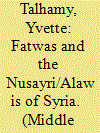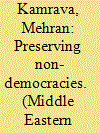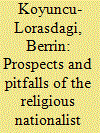|
|
|
Sort Order |
|
|
|
Items / Page
|
|
|
|
|
|
|
| Srl | Item |
| 1 |
ID:
095481


|
|
|
|
|
| Publication |
2010.
|
| Summary/Abstract |
There were five fatwas prior to the twentieth century which were issued by Sunni scholars. Some of these fatwas were specifically against the Nusayris/Alawis while others were against all the extreme Shi'ite creeds including the Nusayris. The first three fatwas were issued during the fourteenth century, during the period of Mamluk rule. They were issued by Shaykh al-Islam Taqi al-Din ibn Taymiyya, and were specifically directed against the Nusayris. The fourth fatwa was issued during the first years of the Ottoman rule over the region of Syria and was against all the extreme Shi'ite creeds. The fifth and last fatwa was issued by a local Shaykh of Latakia specifically against the Nusayris. Those fatwas viewed the Nusayris as heretics outside Islam. During the twentieth century, after the collapse of the Ottoman Empire, the region witnessed the ascendance of 'Pan Arabism', and it was during this period that the Nusayris, known now as Alawis, received a fatwa from the prominent Sunni mufti Hajj Amin al-Husayni recognizing them as part of the Muslim community, which helped them integrate into the Arab world and in Syria. In 1970, the Alawis, under the leadership of the Alawi Hafiz al-Asad, became the rulers of Syria. During the 1970s the Alawis were granted two additional fatwas, this time from prominent Shi'ite scholars recognizing them as part of the Shi'ite creed. All these fatwas had an enormous effect on shaping the history of the Nusayris.
|
|
|
|
|
|
|
|
|
|
|
|
|
|
|
|
| 2 |
ID:
095488


|
|
|
|
|
| Publication |
2010.
|
| Summary/Abstract |
This article aims to offer a brief assessment of the Great Famine of 1870-72 in Iran. Using contemporary sources, it is argued that the Great Famine did not have a single cause. A combination of factors gave rise to the emergence of famine. There was insufficient rainfall, but that was nothing new in Iran. In addition, despite the significance of water provision little had been done to ensure a regular water supply. Further, there seems to have been a shift towards production of cash crop, namely opium, at the expense of food production.In view of this, there were two possible outcomes: first, land under food cultivation may have declined, or in relation to food crops there may have been a shift from irrigated to dry farming. Given the inadequacy of rainfall in most of Iran, dry farming could only increase the incidence of food shortages and in extreme cases, as was the case during the period under consideration here, famine. Had there been any national archives, the issue under consideration could have been examined in details but no such data exists. The article therefore relies on descriptions given by contemporary observers and foreign travellers.
|
|
|
|
|
|
|
|
|
|
|
|
|
|
|
|
| 3 |
ID:
095487


|
|
|
|
|
| Publication |
2010.
|
| Summary/Abstract |
Although researchers have dwelt at length on the political and legal connotations of the term 'terrorism', insufficient attention has been devoted to its historical-linguistic roots, or to the various meanings attributed to the term from ancient times to the present. Questions such as 'in what context political, religious, literary, psychological or physical - is the term being used?' or, whether the interpreter is the perpetrator or the victim, are extremely important. A methodological approach, focusing on so charged a political term, could thus clearly deepen our understanding of what terrorism' has meant and how it has been used throughout history.
|
|
|
|
|
|
|
|
|
|
|
|
|
|
|
|
| 4 |
ID:
095486


|
|
|
|
|
| Publication |
2010.
|
| Summary/Abstract |
Authoritarian elites often prolong their tenure in office by engaging in wholesale institutional change. Whether inherited or created from scratch, state institutions in non-democracies are meant to solidify elite cohesion and political control, pacify potential opponents, and create coalitions that support the state. Nevertheless, autocrats keep a watchful eye on these institutions, and if they change internally in directions that may seem threatening to state leaders, the institutions are changed or even disbanded. Change to the institutions of the non-democratic state is caused by a combination of deliberate decisions and institutional crafting by state leaders on the one hand, and by institutional layering and changes initiated from within the institutions rhemselves on the other. As the cases of the National Assembly in Kuwait, the Revolutionary Command Council in Egypt, and the Revolutionary Council in Iran demonstrate, when and if state institutions become inefficient or are seen as a threat by authoritarian leaders, then state leaders once again take control in determining their shape and configuration. Non-democracies are often preserved through purposive institutional change.
|
|
|
|
|
|
|
|
|
|
|
|
|
|
|
|
| 5 |
ID:
095484


|
|
|
|
|
| Publication |
2010.
|
| Summary/Abstract |
This article examines the interplay of religion and nationalism in Turkey in the post-1990 period and discusses the prospects and pitfalls of religious nationalist movement by focusing on Glen's Turkish Muslimhood. It is believed that the instrumental relationship between Islam and nationalism in Turkey as exemplified in the modernist religious nationalism of Glen will help reveal that Islam has always been an indispensable element of the discourse of nationalism in Turkey and will force us to rethink the role or religion in Turkish society and politics.
|
|
|
|
|
|
|
|
|
|
|
|
|
|
|
|
| 6 |
ID:
095485


|
|
|
|
|
| Publication |
2010.
|
| Summary/Abstract |
The chief rabbi of Yemen, Rabbi Yihye Yishaq Halewi, had a special relationship with the ruler, the Imam Yahya, after the Turks left Yemen in 1918. I will discuss several aspects of this relationship, including the public needs of his congregation in the capital city San'a, such as problems of ownership of the land of the Jewish quarter and collection of the poll tax, aid to Jewish congregations throughout Yemen in maintaining the public order, and efforts on behalf of community leaders who suffered from saving children from the Orphans' Decree.
|
|
|
|
|
|
|
|
|
|
|
|
|
|
|
|
| 7 |
ID:
095483


|
|
|
|
|
| Publication |
2010.
|
| Summary/Abstract |
The article argues that the monarchy's religious authority and its use of rituals of power limit the ability of political parties to contest the monarchy's legitimacy. It goes beyond most institutionalist accounts of authoritarian persistence by exploring the micro-dynamics of symbolic power and the extent to which the regime's ritualization of power creates a political culture conducive to the monarchy's supremacy in the socio-political realm, thus promoting regime stability in Morocco. These rituals have been institutionalized in the political system and have become part of the political discourse in Morocco. The monarchy's religious authority and its use of rituals of power impede the ability political parties to mobilize and to penetrate Moroccan society, and force them to adopt positional strategies in limited elections.
|
|
|
|
|
|
|
|
|
|
|
|
|
|
|
|
|
|
|
|
|